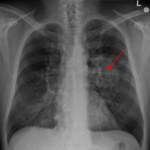
Clinical Oncologist at the Korle Bu Teaching Hospital, Dr Nana Ama Wadee, has raised concern over Ghana’s rising lung cancer deaths, warning that many patients are dying because the disease is often detected too late.
Speaking on Joy FM’s Super Morning Show on Thursday, October 16, as part of Joy Cancer Awareness Month, Dr Wadee explained that while lung cancer is the leading cause of cancer deaths worldwide, Ghana’s situation is particularly troubling because most patients report to the hospital when the disease is already advanced.
“In Ghana, lung cancer currently ranks about ninth or tenth in incidence, but the mortality almost mirrors the incidence,” she said. “As many patients as we see are dying, which reflects the late stage of presentation at which they come.”
Dr Wadee said that globally, smoking remains the biggest risk factor, but Ghana’s relatively low smoking rates suggest many cases are going unnoticed or misdiagnosed.
“We believe there are a lot of underdiagnosed cases,” she said. “Many patients are treated over and over again for other respiratory conditions such as tuberculosis or pneumonia before it is eventually found to be lung cancer.”
She cautioned that lung cancer is not only a smoker’s disease, as about 20% of cases worldwide occur in non-smokers.
Other major risk factors, she explained, include exposure to biomass fuels such as charcoal and firewood, diesel fumes, industrial chemicals, and radon gas.
“A lot of our women use charcoal or wood for cooking, and that constant exposure puts them at risk,” she said.
“There’s also radon gas, which is produced naturally from the decay of uranium in the soil. It is colourless and odourless, so people may not even know they are being exposed.”
She said that the early stages of lung cancer show no clear symptoms, making awareness and suspicion vital.
“Early lung cancer can be completely asymptomatic. When symptoms appear, patients may have a cough, breathlessness, chest pain, or cough up blood.”
She called on both the public and health workers to take persistent respiratory symptoms seriously.
“If you’ve been treated for cough or breathing problems several times and it’s not getting better, talk to your doctor and bring up the possibility of lung cancer. Health professionals should also have a higher index of suspicion because we are missing too many cases,” she urged.


